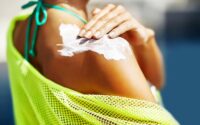Salt may increase your risk for dry, itchy skin by 22%: study
This info might make you a little salty.
A common cooking ingredient could be behind your eczema flares, according to a new study.
Researchers at UC San Francisco say that eating a high-sodium diet may increase your chances of developing eczema. The study, published Wednesday in JAMA Dermatology, found that just an extra gram of sodium a day, the amount found in a Big Mac, can increase the likelihood of an eczema flare by 22%.
Eczema affects 31 million Americans — one in 10 people — will get it in their lifetime, according to the National Eczema Foundation.
“Most Americans eat too much salt and can safely reduce their intake to recommended levels,” Dr. Katrina Abuabara, corresponding author of the study, said in a statement.

“Eczema flares can be difficult for patients to cope with,” added Abuabara, an associate professor of dermatology at UCSF, “especially when they are unable to anticipate them and don’t have recommendations on what they can do to avoid them.”
For the study, researchers analyzed the urine samples and medical records of over 215,000 UK residents between 30 and 70 years old.
Scientists were able to determine whether someone had atopic dermatitis and the severity of the condition from their medical prescriptions and discern how much sodium they were eating by studying their urine samples.

The study linked each extra gram of sodium excreted in urine over 24 hours to an 11% higher chance of an eczema diagnosis, 16% greater odds of an active flare-up, and 11% increased risk their condition would be more severe.
Then researchers began looking at American data. After studying 13,000 adults in the National Health and Nutrition Examination Survey, they determined that eating just an additional gram of sodium a day led to a 22% greater chance of an active case of eczema.


